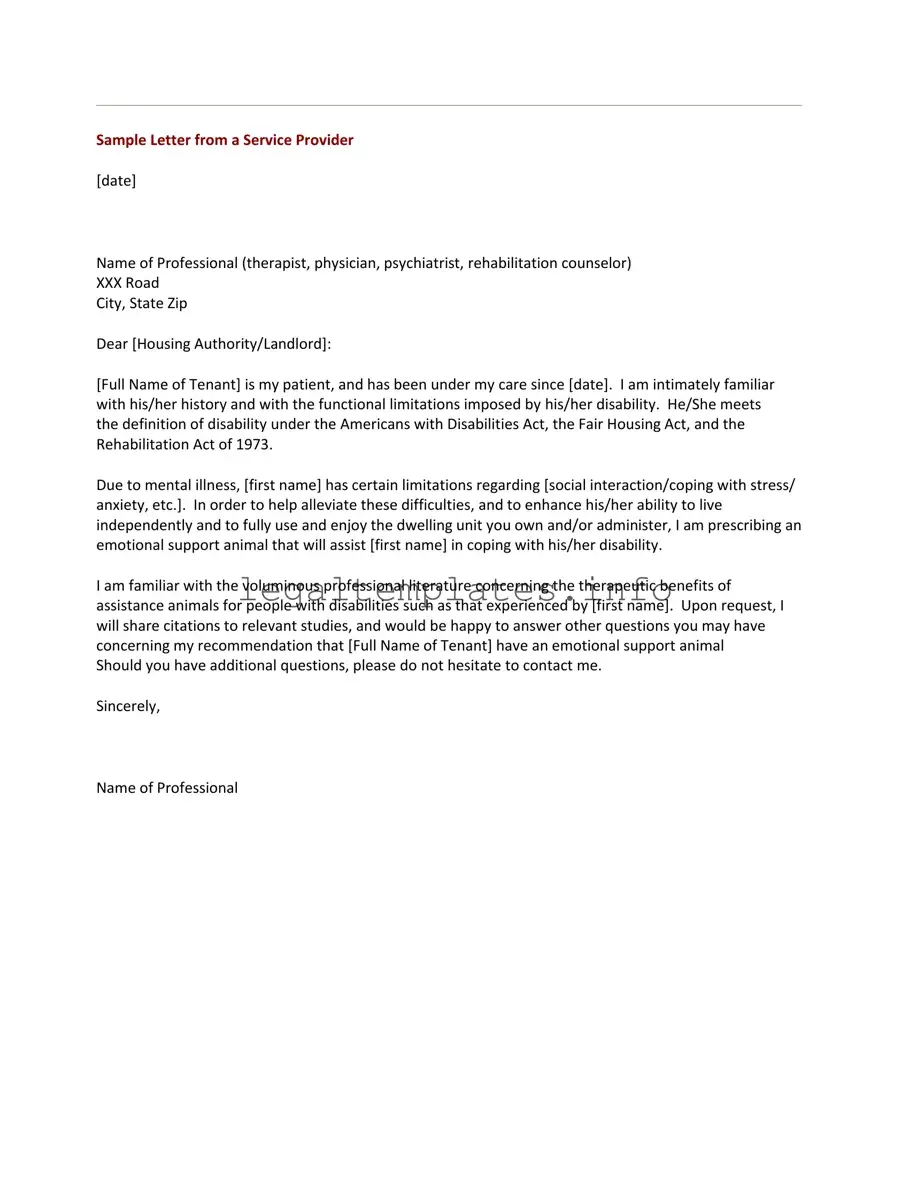An Emotional Support Animal (ESA) Letter shares similarities with a Doctor's Note for Work or School, in that both serve as official documentation from a licensed professional certifying the need for a specific accommodation. Just as a doctor's note might outline the medical necessity for certain workplace or classroom adjustments, an ESA letter explains the necessity of an emotional support animal for someone's mental health treatment or emotional well-being. Both documents are protected under certain laws, offering rights and protections to the individuals presenting them.
Similar to a Service Animal Certification, an ESA Letter also involves animals that assist their owners, but the criteria and legal protections differ. While a Service Animal Certification acknowledges an animal's training to perform specific tasks for physical, psychiatric, sensory, or other disabilities, an ESA Letter recognizes the importance of an animal's presence for emotional support. Unlike service animals, ESAs are not required to be trained for specific tasks, highlighting the difference in their roles and the documentation that supports them.
The concept of a Prescription Letter from a Medical Professional has parallels with an ESA Letter, as both are formal statements from a healthcare provider that recommend a particular treatment or therapy. A prescription letter might specify medication or physical therapy, while an ESA Letter recommends the companionship of a pet for therapeutic reasons. In both cases, they formalize the professional's assessment of the patient's needs and the prescribed solution.
A Reasonable Accommodation Letter in the context of housing is akin to an ESA Letter when it comes to non-discriminatory housing laws. This type of accommodation letter requests modifications or exceptions to standard housing rules to meet the specific needs of individuals with disabilities. An ESA Letter acts as a form of accommodation request, allowing individuals with emotional or mental disabilities to live with their support animals in housing situations where pets might otherwise be restricted.
Comparable to a Psychiatric Service Dog Letter, an ESA Letter also involves animals in mental health care, but serves a different function. Psychiatric Service Dogs are trained to perform tasks that assist individuals with psychiatric conditions, whereas emotional support animals provide comfort by their mere presence. Both documents certify the animal's role in their handler's health care, but they come with different levels of training and legal protections.
Like an Allergy Action Plan tailored for individuals with serious allergies, an ESA Letter caters to the mental health realm, providing a plan of action that involves the presence of an emotional support animal. Allergy Action Plans detail the steps to be taken in case of an allergic reaction, including medication administration and emergency procedures. Similarly, an ESA Letter can be seen as a plan to mitigate mental health symptoms through companionship, even though the preparation and response are fundamentally different.
Resembling an Accommodation Verification Letter, which is often used by students to verify the need for educational accommodations, an ESA Letter verifies the need for an emotional support animal. While the former may confirm the necessity for exam adjustments, note-taking services, or other academic aids for students with disabilities, the latter confirms an individual's need for animal companionship to alleviate mental health symptoms, underscoring the therapeutic relationship between the owner and their ESA.
Similar to Fitness for Duty Certification required by some employers to ensure an employee is physically or mentally able to perform their job duties following an absence due to medical reasons, an ESA Letter certifies that an emotional support animal is a necessary part of an individual's mental health treatment. Though serving different purposes, both documents act as a bridge between medical advice and practical application in daily life.
Much like a Medical Alert Card, which provides essential medical information in a compact form, an ESA Letter communicates crucial information about an individual's mental health needs. A Medical Alert Card might detail allergies, conditions, or medications, whereas an ESA Letter describes the person's need for an emotional support animal. Both serve to inform others of a medical condition or requirement that may not be immediately visible.
An ESA Letter and a Handicap Parking Permit might seem quite different at a glance, but both are designed to provide individuals with certain conditions or disabilities better access to public spaces. Where a Handicap Parking Permit allows individuals with mobility issues to park in designated spaces, an ESA Letter permits individuals with certain mental health conditions the accommodation of an emotional support animal in housing and travel situations where they might otherwise face restrictions. These documents recognize and validate the need for specific accommodations to ensure equality and accessibility.


